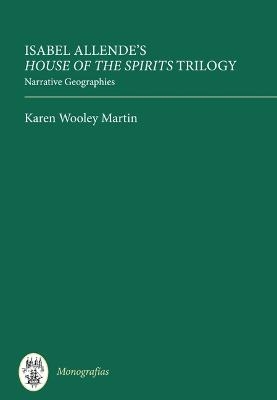
Isabel Allende's House of the Spirits Trilogy
Narrative Geographies
Seiten
2010
Tamesis Books (Verlag)
978-1-85566-200-1 (ISBN)
Tamesis Books (Verlag)
978-1-85566-200-1 (ISBN)
The source of the narrative energy that creates such absorbing stories.
Allende's very popular novels have attracted both critical approval and opprobrium, often at the expense of genuine analysis. This sophisticated study explores the narrative architecture of Allende's House of the Spirits [1982], Daughter of Fortune [1999], and Portrait in Sepia [2000] as a trilogy, proposing that the places created in these novels subvert the patriarchal norms that have governed politics, sexuality, and ethnicity.
Rooted in the Foucauldian premise that the history of space is essentially the history of power, and supported by Susan Stanford Friedman's cultural geographies of encounter as well as Gloria Anzaldúa's study of borderlands, this study shows that, by rejecting traditional spatial hierarchies, Allende's trilogy systematically deterritorializes the elite while shifting the previously marginalized to the physical and thematic centers of her works. This movement provides the narrative energy which draws the reader into Allende's universe, and sustains the 'good story' for which she has been universally acclaimed.
KAREN WOOLEY MARTIN is Associate Professor of Spanish at Union University, Jackson, Tennessee.
Allende's very popular novels have attracted both critical approval and opprobrium, often at the expense of genuine analysis. This sophisticated study explores the narrative architecture of Allende's House of the Spirits [1982], Daughter of Fortune [1999], and Portrait in Sepia [2000] as a trilogy, proposing that the places created in these novels subvert the patriarchal norms that have governed politics, sexuality, and ethnicity.
Rooted in the Foucauldian premise that the history of space is essentially the history of power, and supported by Susan Stanford Friedman's cultural geographies of encounter as well as Gloria Anzaldúa's study of borderlands, this study shows that, by rejecting traditional spatial hierarchies, Allende's trilogy systematically deterritorializes the elite while shifting the previously marginalized to the physical and thematic centers of her works. This movement provides the narrative energy which draws the reader into Allende's universe, and sustains the 'good story' for which she has been universally acclaimed.
KAREN WOOLEY MARTIN is Associate Professor of Spanish at Union University, Jackson, Tennessee.
Introduction: Reading Space in the Trilogy
Roots and Routes to Utopia: Imagined Geographies in Isabel Allende's Fictional Universe
Literary Geographies, Borderlands, and the Boundaries of Identity
Mapping Ethnicity: Race, Class and Mobility in the Trilogy's Newer Narratives
: Navigating Socio-Political Borderlands in House and Nation
Gendered Spaces and Border Crossings: Body/Space in the Trilogy
Transcendent Spaces: Writing and Photography in the Trilogy
Conclusions: Allende's Contested Universe
| Erscheint lt. Verlag | 17.6.2010 |
|---|---|
| Reihe/Serie | Monografías A |
| Verlagsort | Woodbridge |
| Sprache | englisch |
| Maße | 234 x 156 mm |
| Themenwelt | Geisteswissenschaften ► Sprach- / Literaturwissenschaft ► Anglistik / Amerikanistik |
| Geisteswissenschaften ► Sprach- / Literaturwissenschaft ► Literaturwissenschaft | |
| ISBN-10 | 1-85566-200-0 / 1855662000 |
| ISBN-13 | 978-1-85566-200-1 / 9781855662001 |
| Zustand | Neuware |
| Haben Sie eine Frage zum Produkt? |
Mehr entdecken
aus dem Bereich
aus dem Bereich
Poetik eines sozialen Urteils
Buch | Hardcover (2023)
De Gruyter (Verlag)
59,95 €
Buch | Softcover (2024)
belleville (Verlag)
20,00 €


